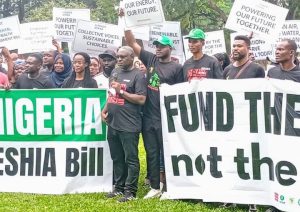

By Correspondent in Abuja.

Stakeholders in the environmental sector have called on the National Assembly to expedite action on the passage of the Environmental, Social and Health Impact Assessment (ESHIA) Bill currently before the House of Representatives.
They made the call during the #DrawTheLine Day of Global Climate Action, held on Sunday in Abuja to demand climate justice.
Dr. Michael David, Executive Director of the Global Initiative for Food Security and Ecosystem Preservation (GIFSEP), described the bill as a critical step towards protecting people and the planet.
He noted that debt cancellation for climate financing would enable African countries, including Nigeria, to channel resources into resilience and sustainability efforts.
“The climate clock shows we have less than three years before irreversible climate damage occurs if urgent action is not taken. We are drawing the line against the use of public funds to support destructive industries that fuel floods, fires, heatwaves, hunger, and poverty.
“Instead, we demand that public money be invested in building a safer, fairer, and more sustainable future for all Nigerians,” David said.
He also urged the government to protect the territories of indigenous peoples and traditional communities across Nigeria and the world, while supporting climate-led solutions.
Similarly, Mr. John Makina, Country Director of Oxfam, represented by Dr. Kenneth Akpan, said Oxfam globally was backing the campaign to address the “silent issues” of climate change, particularly in vulnerable African countries.
“We are supporting this campaign to end poverty, injustice, and highlight gender justice, which is often ignored in climate discussions,” Makina said.
He added that Oxfam was providing capacity training, campaigns, and other resources to amplify advocacy, while also pushing for state governments to develop and implement their own climate policies.
Ms. Francisca Edeh, Project Coordinator for Oxfam Youth Ambassadors, emphasized the role of young people in climate justice, urging policymakers to ensure youth inclusion in all decision-making processes on climate issues.
Edited by Dada Ahmed.

